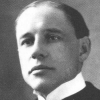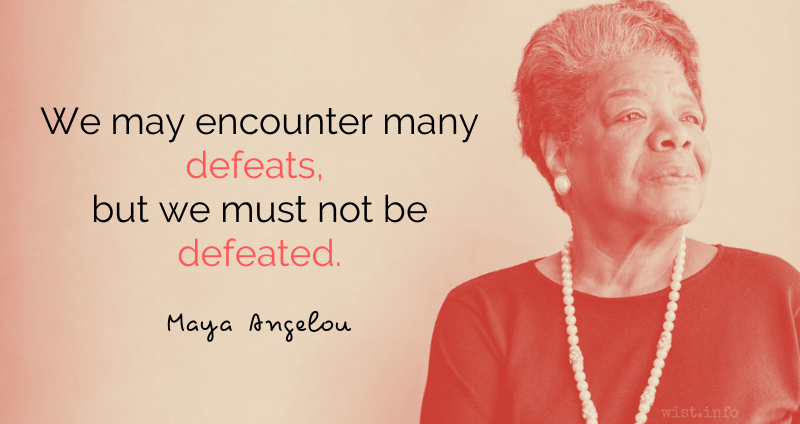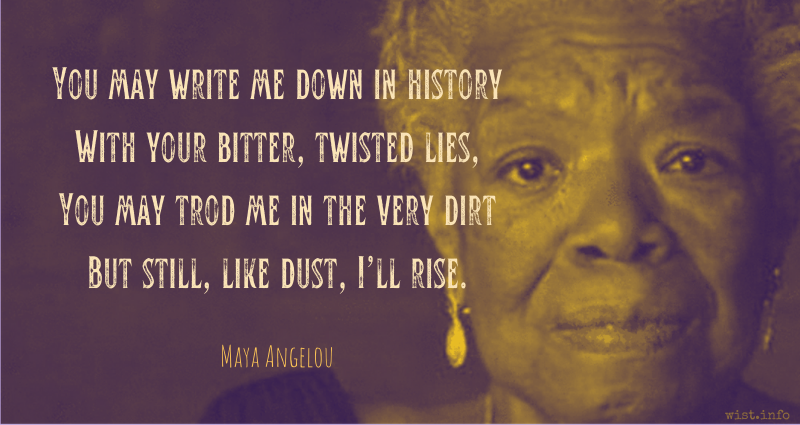The object of education for that mind should be the teaching itself how to react with vigor and economy. No doubt the world at large will always lag so far behind the active mind as to make a soft cushion of inertia to drop upon, as it did for Henry Adams; but education should try to lessen the obstacles, diminish the friction, invigorate the energy, and should train minds to react, not at haphazard, but by choice, on the lines of force that attract their world. What one knows is, in youth, of little moment; they know enough who know how to learn.
Henry Adams (1838-1918) American journalist, historian, academic, novelist
The Education of Henry Adams, ch. 21 (1907)
(Source)
Quotations about:
resilience
Note not all quotations have been tagged, so Search may find additional quotes on this topic.
A good education is not so much one which prepares a man to succeed in the world, as one which enables him to sustain a failure.
Bernard Iddings Bell (1886-1958) American author, Episcopal priest, chaplain, academic, lecturer
“Know How vs. Know Why,” Life Magazine (1950-10-16)
(Source)
Even cowards can endure hardship; only the brave can endure suspense.
Mignon McLaughlin (1913-1983) American journalist and author
The Neurotic’s Notebook, ch. 3 (1963)
(Source)
Always remember: If you’re alone in the kitchen and you drop the lamb, you can always just pick it up. Who’s going to know?
Julia Child (1912-2004) American chef and writer
“What I’ve Learned: Julia Child,” interview by Mike Sager, Esquire (2001-06)
(Source)
Reprinted in Brendan Vaughan, Esquire: The Meaning of Life (2004).
This quotation, and variations on it, are (in)famous regarding Child. The earliest version can be found in her public TV show, The French Chef, 1x22 "The Potato Show" (1963-06-29). In that filmed-live episode, a potato pancake flip ends poorly, spilling onto other parts of the range. Child scoops up the spilled bits and puts them back into the pan:
Well, that didn't go very well. See, when I flipped it I didn't have the courage to do it the way I should have. But you can always pick it up, and if you are alone in the kitchen, who is going to see?
In an era before online video, and on such an initially obscure show, variations appeared almost immediately, e.g., in Blake Hunter, "A Tasty Dish," "Educational TV" column, Film News (1964-10), which gave the quote as happening when a potato pancake spilled on a sideboard:
If this happens, just scoop it back into the pan. Remember, you are alone in the kitchen, and nobody can see you.
The story grew in the telling, and eventually was told as her dropping a chicken. Many folk incorrectly recall this as being one of the gags in the (hilarious) 1978 Saturday Night Live skit starring Dan Aykroyd as Child.
Child often pointed to the incident as involving a potato pancake, not a chicken, though as noted, her lamb comment still stands as another hypothetical.
Depend upon it, you see but half. You see the evil [of matrimony], but you do not see the consolation. There will be little rubs and disappointments everywhere, and we are all apt to expect too much; but then, if one scheme of happiness fails, human nature turns to another; if the first calculation is wrong, we make a second better: we find comfort somewhere — and those evil-minded observers, dearest Mary, who make much of a little, are more taken in and deceived than the parties themselves.
Jane Austen (1775-1817) English author
Mansfield Park, ch. 5 [Henry Crawford to Mary] (1814)
(Source)
Adapt or perish, now as ever, is Nature’s inexorable imperative.
H.G. Wells (1866-1946) British writer [Herbert George Wells]
Mind at the End of Its Tether, ch. 4 “Recent Realizations of the Nature of Life” (1945)
(Source)
Does anything in nature despair except man? An animal with a foot caught in a trap does not seem to despair. It is too busy trying to survive. It is all closed in, to a kind of still, intense waiting. Is this a key? Keep busy with survival. Imitate the trees. Learn to lose in order to recover, and remember that nothing stays the same for long, not even pain, psychic pain. Sit it out. Let it all pass. Let it go.
May Sarton (1912-1995) Belgian-American poet, novelist, memoirist [pen name of Eleanore Marie Sarton]
Journal of a Solitude, “October 6th” (1973)
(Source)
There is, I hope, a thesis in my work: we may encounter many defeats, but we must not be defeated.
Maya Angelou (1928-2014) American poet, memoirist, activist [b. Marguerite Ann Johnson]
“The Art of Fiction,” Paris Review, #116, Interview with George Plimpton (1990)
(Source)
If Afflictions refine some, they consume others.
Thomas Fuller (1654-1734) English physician, preacher, aphorist, writer
Gnomologia: Adages and Proverbs, #2666 (1732)
(Source)
Richard was not dead. He was sitting in the dark, on a ledge, on the side of a storm drain, wondering what to do, wondering how much further out of his league he could possibly get. His life so far, he decided, had prepared him perfectly for a job in Securities, for shopping at the supermarket, for watching soccer on the television on the weekends, for turning up the thermostat if he got cold. It had magnificently failed to prepare him for a life as an un-person on the roofs and in the sewers of London, for a life in the cold and the wet and the dark.
Neil Gaiman (b. 1960) British author, screenwriter, fabulist
Neverwhere, ch. 4 (1996)
(Source)
The above is the original US edition language. The 2006 "Author's Preferred Text" edition restores (even in the US) a few British turns of phrase that were in the original British edition (which I am fortunate enough to own).
Richard was not dead. He was sitting in the dark, on a ledge, on the side of a storm drain, wondering what to do, wondering how much further out of his depth he could possibly get. His life so far, he decided, had prepared him perfectly for a job in Securities, for shopping at the supermarket, for watching football on the telly on the weekends, for turning on a heater if he got cold. It had magnificently failed to prepare him for a life as an un-person on the roofs and in the sewers of London, for a life in the cold and the wet and the dark.
It is a good Blade that bends well.
Thomas Fuller (1654-1734) English physician, preacher, aphorist, writer
Gnomologia: Adages and Proverbs, #2853 (1732)
(Source)
The tactical result of an engagement forms the base for new strategic decisions because victory or defeat in a battle changes the situation to such a degree that no human acumen is able to see beyond the first battle. In this sense one should understand Napoleon’s saying: “I have never had a plan of operations.” Therefore no plan of operations extends with any certainty beyond the first contact with the main hostile force.
You may write me down in history
With your bitter, twisted lies,
You may trod me in the very dirt
But still, like dust, I’ll rise.Maya Angelou (1928-2014) American poet, memoirist, activist [b. Marguerite Ann Johnson]
“Still I Rise,” And Still I Rise (1978)
(Source)
Our greatest glory is, not in never falling, but in rising every time we fall.
Oliver Goldsmith (1730-1774) Irish poet, playwright, novelist
The Citizen of the World: or, Letters from a Chinese Philosopher, Residing in London, to His Friends in the East, Letter 7 (1762)
(Source)
Ostensibly from a Chinese visitor to London, Lien Chi Altangi, the letters were written by Goldsmith and published in The Public Ledger in 1760-61. Letter 22 has the similar "True magnanimity consists not in NEVER falling, but in RISING every time we fall."
The saying is often attributed to Confucius (Letter 7's introduction implied that they were), but is not found in Confucius' work. The saying is also sometimes attributed to Ralph Waldo Emerson. See here for more discussion.
















